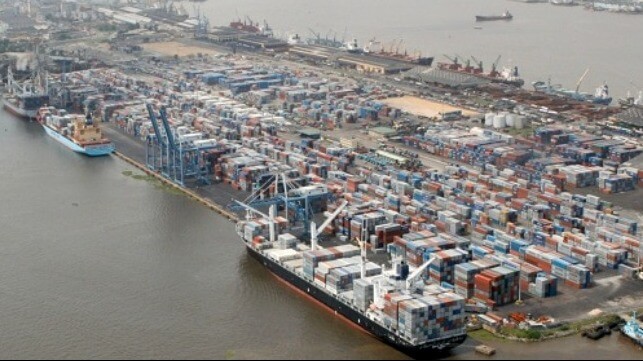"Overtime" Boxes Clog Nigeria's Container Terminals

Container terminals try to discourage long dwell times for cargo, and Lagos' gridlock shows why. Overtime cargo has been identified as a leading cause for the persistent port congestion in Nigeria. Official customs data show that over 8,000 overtime containers valued at $6 billion are abandoned at the major Nigerian terminals, Onne Port and Lagos Ports (Tin Can and Apapa).
The abandoned cargoes are consignments detained by the Nigerian Customs Service (NCS) for overstaying. According to Nigerian customs law, containers are classified as having overstayed if the importer fails to clear it and take delivery after 28 days in port. In that case, the customs service is allowed to auction the cargoes 90 days after arrival.
Delays in auctioning the overtime cargoes have led to some containers remaining at the ports for at least three years.
“The number of overtime boxes abandoned daily is becoming intolerable. The problem does not arise from importers’ unwillingness to clear them but rather due to the harsh operating system,” said Jonathan Nicol, Vice President of Business Action Against Corruption (BAAC) Integrity Alliance, Lagos, Nigeria.
“In Lagos Ports today, we have lots of containers that are already overtime. If proper documentation is done, there could be nothing less than 25 per cent of such containers in Apapa Port,” added Haruna Omolajomo, General Secretary, Association of Bonded Terminal Operators of Nigeria.
A year ago, NCS announced it would purchase electronic scanners to fast-track cargo examination but the project stalled.
For this reason, cargo examination at major Nigerian terminals is done manually. This factor has been cited as a leading reason why Nigerian ports are less competitive in the West African region.
As a result, there are cases where some shippers opt to divert their cargo to the neighboring port of Lomé, Togo, due to the high cost of shipping through Nigeria. A recent business survey revealed that the cost of shipping one TEU from Miami to Lagos was 43 percent higher than the cost for sending the same cargo to nearby Lomé.

that matters most
Get the latest maritime news delivered to your inbox daily.
Last year, Port of Lomé processed over 1.9 million TEU, an increase of 14 percent compared to 2020. Nigerian ports trailed at 1.52 million TEU. The fact that Togo surpasses an African economic giant in the maritime business is a testament of persistent port challenges facing Nigeria.
However, there is still some hope to redeem the situation. Before the end of this year, the Lekki Port container complex will be open for business. Designed to handle over 2.7 million TEU, it is expected to alleviate the congestion problems at Lagos.
